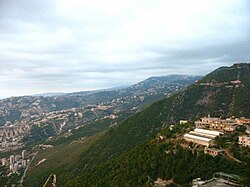Batha, Lebanon: Difference between revisions
No edit summary Tags: Visual edit Mobile edit Mobile web edit |
Added historical source |
||
| (15 intermediate revisions by 9 users not shown) | |||
| Line 1: | Line 1: | ||
[[File:Batha 2018.jpg|thumb]] |
|||
{{Infobox settlement |
{{Infobox settlement |
||
|official_name = Batha |
|official_name = Batha |
||
| Line 37: | Line 38: | ||
[[File:View of Batha.jpg|thumb|right|Batha as seen from [[Ghosta, Mount Lebanon|Ghosta]] ]] |
[[File:View of Batha.jpg|thumb|right|Batha as seen from [[Ghosta, Mount Lebanon|Ghosta]] ]] |
||
'''Batha''' ({{ |
'''Batha''' ({{langx|ar|بطحا}}) is a village in the [[Keserwan District]] of the [[Keserwan-Jbeil Governorate]] of [[Lebanon]]. It is located 28 kilometers northern the Lebanese capital [[Beirut]],<ref name="localiban">{{cite web|title=Batha|url=http://www.localiban.org/article4430.html|website=Localiban|publisher=Localiban|accessdate=2009-07-24|date=2008-01-19}}</ref> and to the east of [[Jounieh]] Bay, with a view of the Mediterranean sea, with average elevation of 580 meters above sea level and total land area approximately 63 [[hectare]]s.<ref name="localiban"/> A water spring flows through the pine and oak tree forests to the north of Batha, watering gardens and orchards before emptying in the Mediterranean sea. Ottoman tax records indicate that Batha had 3 Christian households and 2 bachelors living there in 1543.<ref>{{Cite book |last=Bakhit |first=Muhammad Adnan Salamah |url=https://eprints.soas.ac.uk/29529/1/10731685.pdf |title=The Ottoman Province of Damascus in the Sixteenth Century (PhD) |publisher=School of Oriental and African Studies |year=February 1972 |location=University of London |pages=288}}</ref> |
||
The inhabitants of the town are predominantly [[Maronites|Maronite Catholic]]s.<ref>{{cite web |title=Elections municipales et ikhtiariah au Mont-Liban |url=http://www.localiban.org/IMG/pdf/Elections_municipales_libanaises_2010_-_Mont-Liban.pdf |website=Localiban |publisher=Localiban |accessdate=2016-02-12 |page=19 |
The inhabitants of the town are predominantly [[Maronites|Maronite Catholic]]s.<ref>{{cite web |title=Elections municipales et ikhtiariah au Mont-Liban |url=http://www.localiban.org/IMG/pdf/Elections_municipales_libanaises_2010_-_Mont-Liban.pdf |website=Localiban |publisher=Localiban |accessdate=2016-02-12 |page=19 |date=2010 |url-status=dead |archiveurl=https://web.archive.org/web/20150724081015/http://www.localiban.org/IMG/pdf/Elections_municipales_libanaises_2010_-_Mont-Liban.pdf |archivedate=2015-07-24 }}</ref> Batha is the hometown of Lebanese painter [[Michel Elmir]] (1930–1973) and the hometown of the professor [[Nidal Elmir]] |
||
There are many family in Batha that are widely known: Elmir-Oueiny-Soukayem-Chayeb-Mansour family. |
|||
==References== |
==References== |
||
{{reflist}} |
{{reflist}} |
||
*{{cite thesis|last=|first=|title=|publisher=|date=|type=}} |
|||
{{Keserwan District}} |
{{Keserwan District}} |
||
[[Category:Populated places in Keserwan District]] |
[[Category:Populated places in Keserwan District]] |
||
[[Category:Maronite Christian communities in Lebanon]] |
[[Category:Maronite Christian communities in Lebanon]] |
||
[[Category:Populated places in Lebanon]] |
|||
{{lebanon-geo-stub}} |
{{lebanon-geo-stub}} |
||
Latest revision as of 23:20, 1 December 2024

Batha
بطحا Batha' | |
|---|---|
Municipality | |
 General view of Batha | |
| Coordinates: 33°59′17″N 35°39′33″E / 33.98806°N 35.65917°E | |
| Country | |
| Governorate | Keserwan-Jbeil |
| District | Keserwan |
| Time zone | UTC+02 |
| Area code | 09 |


Batha (Arabic: بطحا) is a village in the Keserwan District of the Keserwan-Jbeil Governorate of Lebanon. It is located 28 kilometers northern the Lebanese capital Beirut,[1] and to the east of Jounieh Bay, with a view of the Mediterranean sea, with average elevation of 580 meters above sea level and total land area approximately 63 hectares.[1] A water spring flows through the pine and oak tree forests to the north of Batha, watering gardens and orchards before emptying in the Mediterranean sea. Ottoman tax records indicate that Batha had 3 Christian households and 2 bachelors living there in 1543.[2]
The inhabitants of the town are predominantly Maronite Catholics.[3] Batha is the hometown of Lebanese painter Michel Elmir (1930–1973) and the hometown of the professor Nidal Elmir
There are many family in Batha that are widely known: Elmir-Oueiny-Soukayem-Chayeb-Mansour family.
References
[edit]- ^ a b "Batha". Localiban. Localiban. 2008-01-19. Retrieved 2009-07-24.
- ^ Bakhit, Muhammad Adnan Salamah (February 1972). The Ottoman Province of Damascus in the Sixteenth Century (PhD) (PDF). University of London: School of Oriental and African Studies. p. 288.
{{cite book}}: CS1 maint: year (link) - ^ "Elections municipales et ikhtiariah au Mont-Liban" (PDF). Localiban. Localiban. 2010. p. 19. Archived from the original (PDF) on 2015-07-24. Retrieved 2016-02-12.


